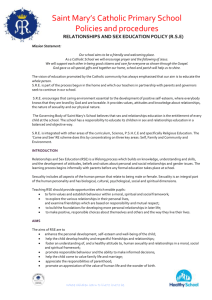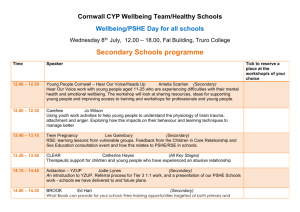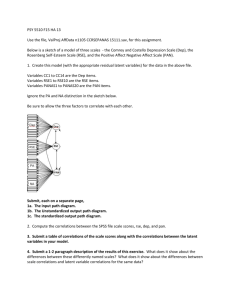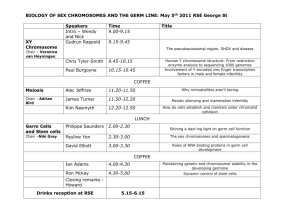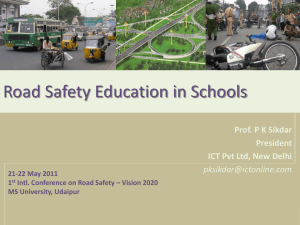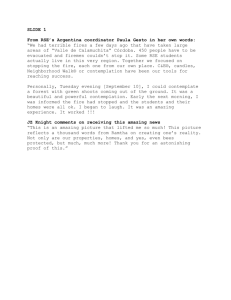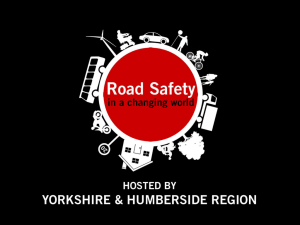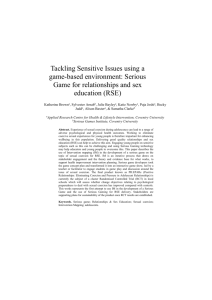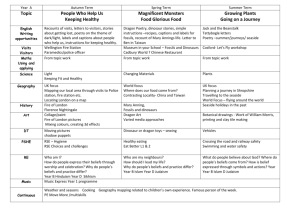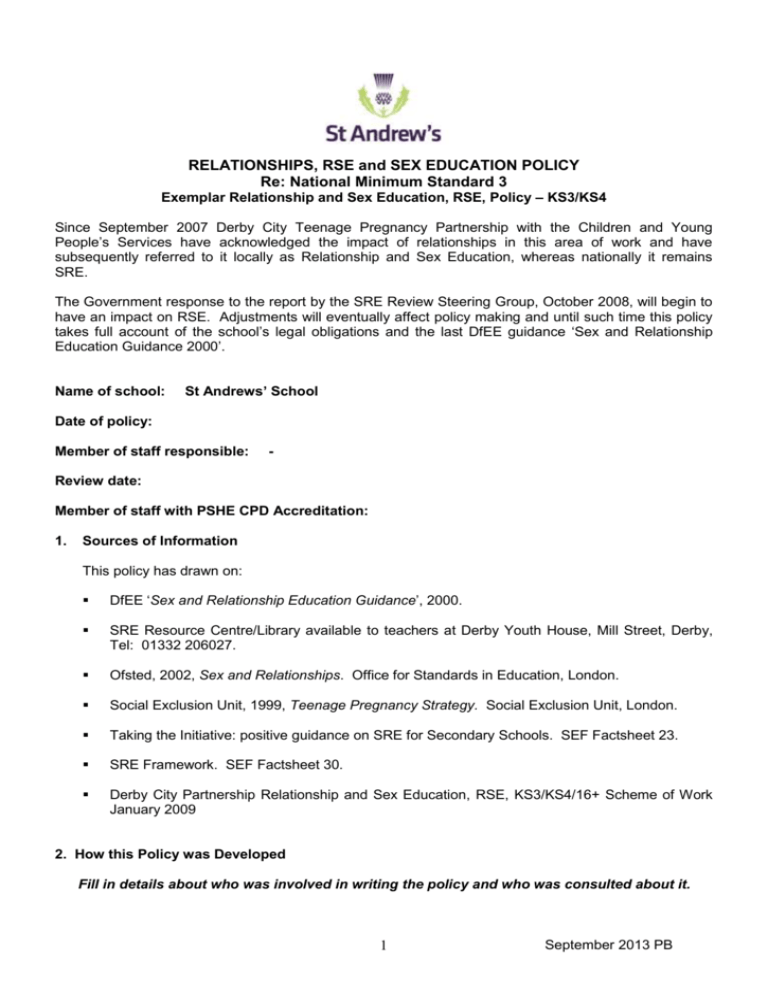
RELATIONSHIPS, RSE and SEX EDUCATION POLICY
Re: National Minimum Standard 3
Exemplar Relationship and Sex Education, RSE, Policy – KS3/KS4
Since September 2007 Derby City Teenage Pregnancy Partnership with the Children and Young
People’s Services have acknowledged the impact of relationships in this area of work and have
subsequently referred to it locally as Relationship and Sex Education, whereas nationally it remains
SRE.
The Government response to the report by the SRE Review Steering Group, October 2008, will begin to
have an impact on RSE. Adjustments will eventually affect policy making and until such time this policy
takes full account of the school’s legal obligations and the last DfEE guidance ‘Sex and Relationship
Education Guidance 2000’.
Name of school:
St Andrews’ School
Date of policy:
Member of staff responsible:
-
Review date:
Member of staff with PSHE CPD Accreditation:
1.
Sources of Information
This policy has drawn on:
DfEE ‘Sex and Relationship Education Guidance’, 2000.
SRE Resource Centre/Library available to teachers at Derby Youth House, Mill Street, Derby,
Tel: 01332 206027.
Ofsted, 2002, Sex and Relationships. Office for Standards in Education, London.
Social Exclusion Unit, 1999, Teenage Pregnancy Strategy. Social Exclusion Unit, London.
Taking the Initiative: positive guidance on SRE for Secondary Schools. SEF Factsheet 23.
SRE Framework. SEF Factsheet 30.
Derby City Partnership Relationship and Sex Education, RSE, KS3/KS4/16+ Scheme of Work
January 2009
2. How this Policy was Developed
Fill in details about who was involved in writing the policy and who was consulted about it.
1
September 2013 PB
RELATIONSHIPS, RSE and SEX EDUCATION POLICY
Re: National Minimum Standard 3
3. What is RSE?
The term Relationship and Sex Education, RSE, is used in this policy rather than sex education.
This is to stress that our approach goes beyond provision of biological information to also focus on
clarifying attitudes and values, and developing self-esteem and the skills to manage relationships.
According to the latest DfEE guidance RSE is:
‘…lifelong learning about physical, moral and emotional development. It is about the
understanding of the importance of marriage for family life, stable and loving relationships,
respect, love and care. It is also about the teaching of sex, sexuality and sexual health’
DfEE ‘Sex and Relationship Guidance’, 2000.
The guidance suggests that RSE should have three main elements as follows:
Knowledge and understanding
Learning and understanding physical development at appropriate stages.
Understanding human sexuality, sexual health, emotions and relationships.
Learning about contraception and a range of local and national sexual health advice,
contraception and support services.
Learning the reasons for delaying sexual activity, the benefits to be gained from such delay.
The avoidance of unplanned pregnancy.
Attitudes and values
Learning the importance of values and individual conscience and moral considerations.
Learning the value of family life, marriage and stable and loving relationships for the nurture of
children.
Learning the value of respect, love and care.
Exploring, considering and understanding moral dilemmas.
Developing critical thinking as part of decision making.
Personal and social skills
Learning to manage emotions and relationships confidently and sensitively.
Developing self-respect and empathy for others.
Learning to make choices based on an understanding of difference and with an absence of
prejudice.
Developing an appreciation of the consequences of choices made.
Managing conflict.
Learning how to recognise and avoid exploitation and abuse.
The schools approach to RSE consists of:
1. the taught National Curriculum Science Programme of Study
2. RSE modules within each Key Stage delivered within a planned PSHE Education programme
3. pastoral support for students who experience difficulties
4. provision of appropriate information through leaflets and books in the library, display of posters
and appropriate websites as highlighted in the Sexual Health Services in Derby leaflet or in the
RSE Scheme of Work.
4.
Why RSE?
2
September 2013 PB
RELATIONSHIPS, RSE and SEX EDUCATION POLICY
Re: National Minimum Standard 3
4.1 Legal obligations
Maintained secondary schools in England and Wales have a legal responsibility to provide a
‘sex education’ programme. They also have a responsibility to keep an up to date written
statement of the policy they choose to adopt and this must be available to parents. Parents
have a right to withdraw their children from ‘sex education’ lessons which fall outside those
aspects covered in the National Curriculum Science.
4.2 The needs of young people and the role of schools
The overall aims of the school and New Secondary curriculum are for all young people to
become:
successful learners who enjoy learning, make progress and achieve
confident individuals who are able to live safe, healthy and fulfilling lives
responsible citizens who make a positive contribution to society.
The DfEE ‘Sex and Relationship Guidance’, 2000, recommends that ‘Effective sex and
relationship education is essential if young people are to make responsible and well informed
decisions about their lives’. The school has a key role, in partnership with parents/carers, in
providing RSE.
Research has shown that young people who feel good about themselves, and are
knowledgeable and confident about sex and relationships, are more likely to be more discerning
in their relationships and sexual behaviours and to have fulfilling relationships.
‘Research demonstrates that good, comprehensive sex and relationship education does
not make young people more likely to enter into sexual activity. Indeed it can help them
learn the reasons for, and the benefits to be gained from, delaying such activity’.
DfEE ‘Sex and Relationship Guidance’, 2000.
4.3 National and local support and guidance for schools to develop RSE
Rates of teenage pregnancy, abortion and sexually transmitted infection in the UK are among
the highest of all European countries. The Government has developed a comprehensive
strategy to change this situation and RSE for pupils in both primary and secondary schools is
seen, alongside other initiatives, as a key element. Our schools approach to RSE is in line with
the Government’s strategy and guidance given to schools in DfEE ‘Sex and Relationship
Guidance’, 2000.
At a local level support and guidance for schools to develop RSE includes:
the RSE Scheme of Work for KS3/KS4/16+ that has been developed as a result of Derby
City Teenage Pregnancy Partnership/Children and Young People’s Services vision and
funding and the recognition that good quality RSE is a vital tool in the drive to reduce the
number of teenage pregnancies and sexually transmitted infections
access to the PSHE CPD Accreditation programme, offered nationally by the University of
Roehampton but with organisation and training provided locally by the Derby City PSHE and
September 2013 PB
3
RELATIONSHIPS, RSE and SEX EDUCATION POLICY
Re: National Minimum Standard 3
4.4
Citizenship and Healthy Schools Teams. To date a good number of PSHE co-ordinators,
school nurses and youth workers have achieved status
advice and training offered to whole school teaching staff, school governors and to parents
in RSE and PSHE and Citizenship by the Derby City PSHE and Citizenship Team and
Healthy Schools Consultant for Relationship and Sex Education
engagement in the National Healthy Schools Programme and the Enhancement
programme.
Please contact your Healthy Schools Consultant to discuss.
National Healthy Schools
At Derby Secondary school we recognise the National Healthy Schools Programme as an
effective vehicle to promote PSHE education which offers an integrated whole school
approach, set alongside nationally agreed criteria, looking at health and wellbeing issues in
their wider sense.
Derby Secondary school is working with local partners, agencies, theatre in
education
companies, LA Advisers and Consultants to ensure appropriate provision in the key areas of
PSHE, including RSE and Drug Education, Healthy Eating, Physical Activity and Emotional
Health and Wellbeing.
5. Morals and Values Framework
Our approach to RSE will be conducted within a clear morals and values framework based on the
following principles:
The value of stable and loving relationships.
Respect, understanding and empathy towards others who may have different backgrounds,
cultures, sexuality, feelings and views.
The development of relationships, including sexual relationships, based on mutual consent,
rather than coercion.
The right not to be abused by other people or be taken advantage of.
The right of people to follow their own sexuality, within legal parameters.
We also believe that students have an entitlement to:
age and circumstance appropriate RSE
access to help from trusted adults and helping services.
RSE involves consideration of a number of sensitive issues about which different people may hold
strong and varying views. The school’s approach to RSE will be balanced and take account of, and
be sensitive to, different viewpoints but will not be based on personal bias. We shall endeavour to
have an approach that is educational, rather than one based on propaganda and sensationalism.
4
September 2013 PB
RELATIONSHIPS, RSE and SEX EDUCATION POLICY
Re: National Minimum Standard 3
6. Inclusion
‘Mainstream schools and special schools have a duty to ensure that children with special
educational needs and learning difficulties are properly included in sex and relationships education.
Sex and relationship education should help all pupils understand their physical and emotional
development and enable them to make positive decisions in their lives’.
DfEE SRE Guidance, July 2000
Young people may have varying needs regarding RSE depending on their circumstances and
background. The school strongly believes that all students should have access to RSE that is
relevant to their particular needs. To achieve this the school’s approach to RSE will take account of:
The needs of boys as well as girls Girls tend to have greater access to RSE than boys, both
through the media, particularly teenage magazines, and the home. We will consider the particular
needs of boys, as well as girls, and approaches that will actively engage them. We shall also be
proactive in combating sexism and sexist bullying.
Ethnic and cultural diversity Different ethnic and cultural groups may have different attitudes to
RSE. The school will consult students and parents/carers about their needs, take account of their
views and promote respect for, and understanding of, the views of different ethnic and cultural
groups.
Varying home backgrounds We recognise that our students may come from a variety of family
situations and home backgrounds. We shall take care to ensure that there is no stigmatisation of
children based on their home circumstances.
Sexuality On average, about 5% of our students will go on to define themselves as gay, lesbian or
bi-sexual, GLB. Students may also have GLB parents/carers, brothers or sisters, other family
members and/or friends. All our students will meet and work with GLB people. Our approach to
RSE will include sensitive, honest and balanced consideration of sexuality. Our pastoral support will
take account of the needs of GLB students. We shall promote a culture of care and respect and
also actively tackle homophobic bullying.
Special educational needs We shall take account of the fact that some students may have
learning, emotional or behavioural difficulties or physical disabilities that result in particular RSE
needs.
The teaching programme for Relationship and Sex Education We intend that all students shall
experience a programme of RSE at a level which is appropriate for their age and physical
development, with adaptations for those whose cognitive development is particularly slow.
Students who use alternative methods of communication Some students have physical, visual
or hearing impairments or are unable to use speech and may use signing, symbols and/or
communication switches and aids. The staff will adapt their teaching of RSE to ensure that these
students have equal access. For example Writing with Symbols computer programme includes
‘private’ body parts.
Students with profound and multiple learning difficulties are not excluded from the programme.
Using appropriate methods, they will experience most of the basic content; self-awareness, gender
awareness, body recognition, privacy.
Students with autism will require individual teaching to meet their specific needs. RSE may be
included in a TEACHH programme and Picture Exchange Communication Systems, PECS, is
suitable for areas such as toilet training. Explicit teaching and use of pictures and visual aids is
essential to avoid confusion.
Contraceptive advice to older students Students will be taught, in the context of sexual intimacy
and safer sex, that intercourse should always involve using a condom.
5
September 2013 PB
RELATIONSHIPS, RSE and SEX EDUCATION POLICY
Re: National Minimum Standard 3
Questions about forms of contraception will be answered accurately and honestly within the
student’s ability to understand. If students need further personal advice about contraceptive use,
counselling and support will be sought from appropriate agencies and personnel.
7. A Whole School Approach
A whole school approach will be adapted to RSE that actively involves the whole school community.
All groups who make up the school community have rights and responsibilities regarding RSE. In
particular:
The senior leadership team, SLT, will endeavour to support the provision and development of RSE
in line with this policy by providing leadership and adequate resourcing.
The designated RSE co-ordinator, currently . . . . . . . . . . , will maintain an overview of RSE
provision and have overall responsibility for its development. This will include keeping up to date
with developments and good practice, accessing training, developing the provision to meet students’
needs, providing support and resources for staff, arranging staff training, liaison with outside
agencies and monitoring and evaluation.
Teaching staff All teachers are involved in the school’s RSE provision. Some teach RSE through
the PSHE programme and some through science and other curriculum areas. All teachers play an
important pastoral role by offering support to students. Any teacher can be approached by a student
who experiences a difficulty regarding relationship and sex issues. Teachers will be consulted about
the school’s approach to RSE and aided in their work by provision of resources, background
information, support and advice from experienced members of staff and access to appropriate
training.
Non-teaching staff may be involved in a supportive role in some RSE lessons and also play an
important, informal pastoral support role with students. They will have access to information about
the RSE programme and supported in their pastoral role.
Governors have responsibilities for school policies. They will be consulted about the RSE provision
and policy and have regular reports at Governor’s meetings. Good practice would be to have a
designated governor with responsibility to oversee PSHE Education, including RSE and access
appropriate training.
Parents/carers have a legal right to view this policy and to have information about the school’s RSE
provision. They also have a legal right to withdraw their children from dedicated sex education
lessons if they wish, see section 8.8. The school will seek and take account of parent/carer views
and endeavour to adopt a partnership approach with parents/carers. This will periodically include
information/education workshops for parents/carers. The school’s approach to RSE will encourage
dialogue between parents/carers and their children.
The school nurse can play a key role in supporting the teacher in RSE both in terms of advice,
input into lessons, provision of pastoral support for students and resources. The school will work in
ongoing consultation and partnership with the school nurse.
Outside agencies and speakers may be involved in inputting to RSE lessons and as points of
referral as support services for students. The school will only work with agencies and speakers who
are appropriate to student needs. We shall work in partnership with them and jointly plan their work
within the school. We will aim to use the exemplar pro-formas recommended by the Derby City
PSHE Team: ‘Agreement between Schools and External Contributors into PSHE’, Appendix 2, and
the ‘Checklist for Effective Practice in PSHE’,
Appendix 3. The school will also promote relevant helping agencies that students can access.
6
September 2013 PB
RELATIONSHIPS, RSE and SEX EDUCATION POLICY
Re: National Minimum Standard 3
Students have an entitlement to age and circumstance appropriate RSE and to pastoral support.
They will be actively consulted about their RSE needs and their views will be central to developing
the provision.
8. The Taught RSE Programme
The RSE programme will be delivered as part of the school’s approach to PSHE Education and
Citizenship.
8.1 Aims of the programme
The overall aims of the RSE programme are to:
1. provide accurate information about, and understanding of, RSE issues
2. dispel myths
3. explore a range of attitudes towards RSE issues and to help students to reach
their own informed views and choices for a healthier lifestyle
4. develop respect and care for others
5. increase student’s self-esteem
6. develop skills relevant to effective management of relationships and sexual
situations. Examples include communication with and empathy towards others,
risk assessment, assertiveness, conflict management, decision making, seeking
help and helping others
7. contribute to a reduction in local and national teenage pregnancy, sexually
transmitted infections and abortion rates.
8.2 Place in the curriculum
The main RSE programme will be delivered through PSHE lessons by a team of, fill in
whether it is delivered by a dedicated team of teachers or tutors. In addition certain
biological aspects are delivered through Science lessons and other aspects of RSE arise in.
Fill in other relevant subject areas.
8.3 Content and learning objectives
The RSE programme is delivered in a developmental manner so that issues are explored in
greater depth as students mature. The following areas of content are addressed in the following
years.
Year
Content/ learning objectives
Subject area addressed in
Fill in details of your programme in each year or state how you follow the exemplar Derby
City RSE Scheme of Work or attach the Overview of Lesson contents for both Key Stage
3 and Key Stage 4 from the scheme of work.
8.4 Methodology and resources
7
September 2013 PB
RELATIONSHIPS, RSE and SEX EDUCATION POLICY
Re: National Minimum Standard 3
A wide range of teaching methods are used, that enable student’s to actively participate in their
own learning. This includes use of quizzes, case studies, research, role-play, video, small
group discussion and use of appropriate guest speakers. Where it is regarded as particularly
beneficial students are divided into single gender groups for a part of lessons or whole lessons.
Occasional use of theatre in education productions also forms part of the programme.
Teaching is conducted in a safe learning environment through the use of ground rules and
distancing techniques so that students are not put on the spot or expected to discuss their own
personal issues in class. Teaching resources are selected on the basis of their appropriateness
to students.
8.5 Answering student’s questions
The school believes that students should have opportunities to have their genuine questions
answered in a sensible and matter-of-fact manner. However, occasionally a student may ask a
particularly explicit, difficult or embarrassing question in class. Teachers will use their skill and
discretion to decide about whether to answer questions in class and, if so, how. They will
establish clear parameters of what is appropriate and inappropriate in class by discussing
ground rules with students and by taking an approach that encourages students to be mature
and sensible.
If a teacher does not know the answer to a question they will acknowledge this and suggest that
they and students research the answer to the question later. If a question is too explicit or
inappropriate to answer in class at that moment, teachers will acknowledge it and attend to it
later with the student who asked it. If a question is too personal teachers will remind students
about the ground rules and if necessary point out appropriate sources of support. If a teacher is
concerned that a student is at risk of sexual abuse they will follow the school’s safeguarding
procedures.
8.6 Monitoring and evaluation
The programme is regularly evaluated by the RSE co-ordinator. The views of students and
teachers who deliver the programme are used to make changes and improvements to the
programme on an ongoing basis.
Monitoring and evaluation arrangements are open to external assessment by the LA and
Ofsted.
8.7 Assessment
Pupils’ progress in RSE is assessed as part of the PSHE assessment. Pupils’ knowledge, skills
and attitudes are assessed through a range of methods including teacher, peer and self
assessment.
Please exemplar Derby City RSE Scheme of Work for a suitable model - Page 29.
8.8 Parental concerns and withdrawal of students
8
September 2013 PB
RELATIONSHIPS, RSE and SEX EDUCATION POLICY
Re: National Minimum Standard 3
Parents have a legal right to withdraw their children from dedicated ‘sex education’ lessons.
They do not have a right to withdraw their children from those aspects of RSE that are taught in
National Curriculum Science or where RSE issues arise incidentally in other subject areas.
We will work in active partnership with parents/carers, value their views and keep them
informed about out RSE provision.
If a parent/carer has any concerns about the RSE provision we will take time to address their
concerns and allay any fears they may have. If any parents/carers decide to withdraw their
child we shall work with them and their child to explore possible alternative provision.
9. Pastoral Support for Students who Experience Difficulties
9.1 The nature of support available to students
The school takes its role in the promotion of student welfare seriously. Staff endeavour to make
themselves approachable and to provide caring and sensitive pastoral support for students in a
number of ways. Staff may be approached for help on an individual basis and through the
tutorial/ pastoral system. They offer a listening ear and kind eyes and, where appropriate,
information and advice. The school nurse offers a health and support service to students.
Where appropriate, students are referred to the school nurse and/or outside helping agencies.
The school will keep up to date about the development of local services and national help lines
for young people, promote their existence to students and endeavour to form working
relationships with local agencies that are relevant to student needs.
9.2 Confidentiality and informing parents/carers
We are aware that some parents find it hard to cope with their children’s sexual development,
and are happy for the school to take the initiative. We will take every opportunity to inform and
involve parents and carers:
by making our commitment clear in the school prospectus
by placing RSE on the agenda at the relevant governors’ meeting
by inviting parents to discuss RSE when their child enters the school and at primarysecondary transition
by discussing and agreeing a consistent approach for students to be used at home and
school
by including RSE in the Home/School Partnership Agreement
by inviting parents to a meeting where resources are available, and their use explained.
9
September 2013 PB
RELATIONSHIPS, RSE and SEX EDUCATION POLICY
Re: National Minimum Standard 3
School staff cannot promise absolute confidentiality if approached by a student for help. Staff
must make this clear to students. Safeguarding procedures must be followed when any
disclosures about abuse are made.
It is very rare for a student to request absolute confidentiality. If they do, in situations other than
those involving safeguarding issues, staff must make a careful judgement about whether or not
a third party needs to be informed.
This judgement will be based upon:
the seriousness of the situation and the degree of harm that the student may be experiencing
the student’s age, maturity and competence to make their own decisions.
Where it is clear that a student would benefit from the involvement of a third party, staff should
seek the consent of the student to do so.
If appropriate, staff might inform the third party together with the student.
inappropriate, students will always be encouraged to talk to their parent/carer.
Unless clearly
8.3 Dealing with bullying
Bullying commonly includes inappropriate and hurtful comments and behaviours concerning
sexism, homophobia, appearance and other sex/relationship issues. The school takes the
issue of bullying very seriously in line with DCSF ‘Safe to Learn’ Guidance 2007. This is
reflected in the school’s anti-bullying policy. Staff will challenge and deal sensitively with any
evidence of bullying. Students will be encouraged to report any incidents. Staff will endeavour
to investigate any incidents of bullying as soon as possible and give feedback to students who
complain of bullying. The RSE and PSHE programmes will consider bullying and aim to
discourage bullying based on sexism, homophobia, appearance and other sex/relationship
issues.
All schools are required to report and log all known incidents of bullying on school premises and
to provide an annual summative report to the local authority. The reporting process and form is
contained in the LA ‘An Exemplar Anti-bullying Policy’. It is important that any form of
harassment or hurtful comments of a sexual nature are seen within the context of the schools
anti-bullying policy.
9. Dissemination of the Policy
10
September 2013 PB
RELATIONSHIPS, RSE and SEX EDUCATION POLICY
Re: National Minimum Standard 3
Fill in details of who the policy has been disseminated to and how and where people can
access further copies if needed
Members of school community
Date consulted
Date
disseminated
Signature of
representative
Head teacher
Teaching staff
Class based support staff
Midday Supervisors
Non-class based support staff
Pupils
Governors
Parents
10. Policy Review and Development Plan
Fill in details of:
1. When the policy will be reviewed, how and by who.
2. Priority areas for development of RSE.
This policy should be read in conjunction with the school PSHE Education policy for
KS3 and KS4.
11
September 2013 PB
RELATIONSHIPS, RSE and SEX EDUCATION POLICY
Re: National Minimum Standard 3
Appendix 1
A Guide to Using the Example RSE Policy
The example policy is not a finished policy. It is for you to adapt and change so that you can come
up with your own draft policy that reflects the ethos and circumstances of your school and your
particular approach to RSE.
You may need to address some issues in your policy that are not covered in the example policy.
Think about what is important to your school.
Once you have a draft the next task is to Consult before reaching a final policy.
You can take the time to consult before finalising the policy. In the meantime you can work with the
draft. If you have an Ofsted inspection showing them the initial draft and explaining your consultation
plans will be fine. Consultation with different members of the school community can give RSE greater
prominence, help improve the practice and educate everyone and increase their awareness. So . . .
Who are you going to consult?
SLT
Teachers who deliver RSE
Other teaching staff
Non-teaching staff
Governors
Parents/carers
School nurse
Outside agencies
Students
How are you going to consult them?
Staff training/ meeting
Governor meeting
Workshop
or
meeting
with
parents/carers, possibly through the
parent’s association
Discussion in RSE/PSHE lessons
Discussion at school council
Questionnaire/ survey
Working group of representatives
reflecting the whole school community
Discussion with individuals who are
representative of different groups
In some instances you may ask people to look through all, or some, of the draft policy and then feed
back to you. In other instances you may not get them to read through the document but instead ask
them what they think about particular issues and then take account of what they say in the policy.
12
September 2013 PB
RELATIONSHIPS, RSE and SEX EDUCATION POLICY
Re: National Minimum Standard 3
Appendix 2
Agreement between Schools and External Contributors into PSHE
School:
External Contributor/Organisation:
Address:
Address:
Contact Person:
Contact Person:
Phone:
Phone:
E-mail:
E-mail:
Date(s) of contribution:
Name of Educator:
Approximate Timings:
Year Group:
Number of Pupils:
Equipment, Class Layout:
Content of Contribution:
I/we understand the principles of effective practice and agree to:
1. Follow effective practice guidance (see checklist).
2. Contribute to monitoring and evaluation procedures.
Signed: __________________________
School Representative
Representative
Signed: _____________________________
Contributing
Agency
Date: ____________________________
Date: ______________________________
13
September 2013 PB
RELATIONSHIPS, RSE and SEX EDUCATION POLICY
Re: National Minimum Standard 3
Appendix 3
Checklist for Effective Practice in PSHE
This checklist is designed to support the drawing up of guidelines for effective practice and to help
schools and external contributors develop effective practice in Citizenship.
Yes
No
Have you been made aware of:
the school’s values and approach to PSHE?
their policies on PSHE, confidentiality, disclosure, child protection?
Is your organisation’s approach consistent with these?
Do you know what the overall aims of the school PSHE programme are?
Is the content of your contribution consistent with the overall aims of the
PSHE programme?
Have pupils’ needs been assessed by the school?
Has the content of the contribution been negotiated so that it meets the
needs of the pupils?
Have you been made aware of your role, responsibilities and boundaries?
Are you clear what your boundaries are when working in the classroom?
Do you know:
how your contribution fits into the PSHE programme?
what precedes your contribution?
what follows your contribution?
Have the desired learning outcomes for the lesson been negotiated with
the school?
Is your contribution something that the teacher alone cannot deliver?
Are you a competent educator or facilitator for this contribution?
Have you had training to develop your skills?
Have you been asked to provide input outside your area of expertise?
Will you be using active learning methods?
Will the teacher stay in the room for the whole of the lesson?
If not, have you been subject to a Criminal Records Bureau check?
Is your contribution being assessed through pupil feedback and
evaluation?
Is your contribution being shared and used to inform future work?
14
September 2013 PB

